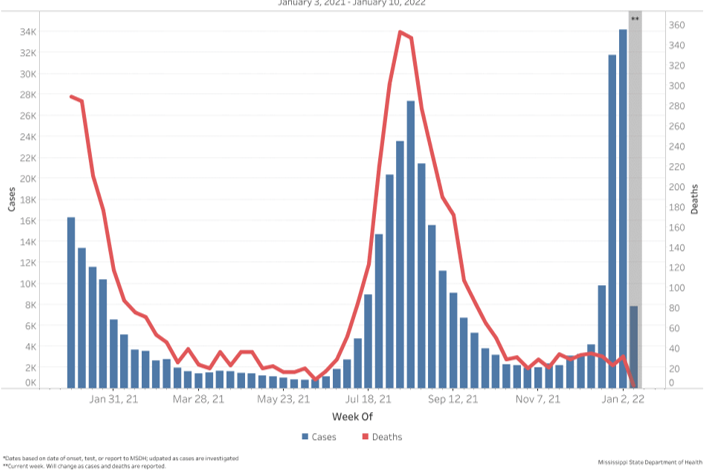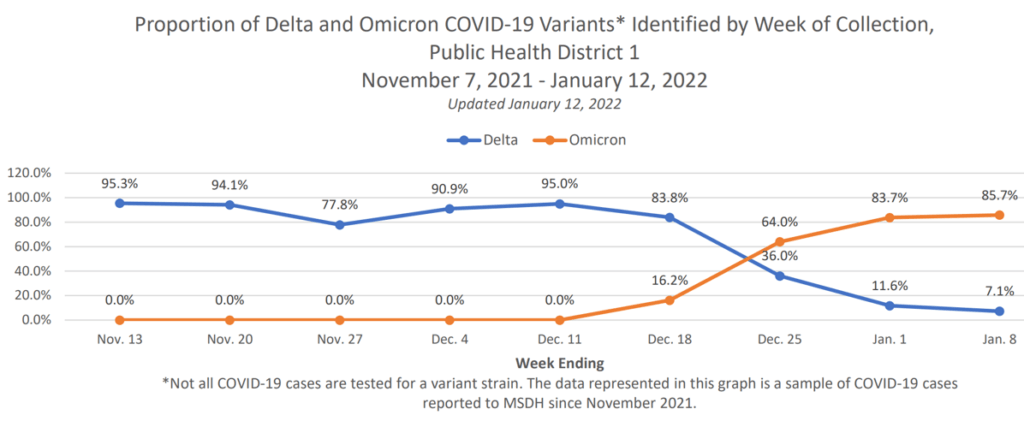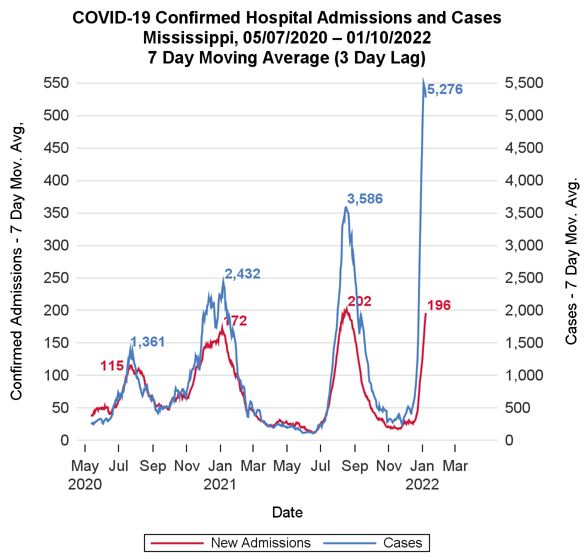Update: Omicron is not the foundational Mississippi problem-the RN shortage is

January 18, 2022
A message from Lee Bond, Singing River Health System CEO:
Fortunately, Omicron, while very contagious, is proving to be mild. The bedside RN shortage, on the other hand, is deadly (especially in poor states like Mississippi). Examples abound, and they illustrate the life-and-death consequences of this shortage. Just a few days ago, we accepted and saved the life of a patient transferred from a hospital in Yazoo, Mississippi – more than 200 miles away. The hospital called 27 other hospitals, all of which were “full” and unable to take the patient because of the bedside RN shortage in Mississippi. Another colleague in North Mississippi shared that they were unable to transfer a patient with a brain bleed anywhere in the state; each facility had beds, but not enough RN’s to staff them. After anguishing hours of trying hospitals throughout the region, they finally were able to get one to accept a transfer of the patient – to Florida. Lastly, one of the many heartbreaking illustrations of the severity of the RN shortage we have heard over the past few days: a Mississippi hospital literally begged all other hospitals for help across the state in transferring a young patient who was critically ill. They eventually found an accepting facility, but the patient died en route. The transfer came too late. By the way, none of these were CoViD patients.
With each passing day, there are more and more stories like this. It is a sad unacceptable situation. Mississippi hospitals are desperate for support. Not-for-profit, governmental safety-net hospitals simply do not have enough funds from regular ongoing business operations to pay RNs what they can make in other states (reimbursement from insurance companies and patients is actually per capita going down). Did you know that the State has received $1.8 billion in American Rescue Plan Act money, primarily intended to help with this very problem? Allocating just a fraction of that could help solve this RN shortage, as we have asked through our Save the Life Savers Plan. Only 3% of the funds ($55m) are currently targeted at addressing the shortage, while most of $1.8 billion is planned for infrastructure and broadband-type projects. If those projects receive funding while the lives-saving project does not, Mississippi will lose even more beside RNs from our state.
On the bright side, the viral evolution of CoViD is not unexpected. Omicron is more contagious, but its symptoms are generally milder. This is part of the standard viral evolution. What is unexpected is the news media and federal government leaders have not done quite enough reporting and planning about this expectation, and some have lost focus on the greater issue of the foundational RN shortage.
We see numerous headlines about “The Great Resignation” and how many people in America are just quitting. At Singing River, yes, we have lost some, but the strongest, the best, the most dedicated, and most loyal to their team and their community and their families have stayed. They continue to work. Every day they have chances and reasons to give up, but they do not. God bless them. They have not resigned; they are still here. I hope the world will one day have more headlines about the rare “doers” who have resolved to have the grit and determination to do whatever it takes to help their community within their noble profession.
As I left the ER at one of our hospitals last night, I wondered if our team feels a little bit like how Job felt? If you are unfamiliar with the Book of Job, it is basically about a man facing unmerited suffering but still maintaining his faith; “Shall we accept good, and not accept adversity?” the Bible quotes. That resonates with me because, in the face of absolute, and some ways unconscionable adversity, I see the strongest on our team pulling everyone through, having the faith that our Singing River Strong team will pull their coworkers and our community through this.
****
A few graphs: they show that Omicron is far and away the predominant strain out there (91.5%!), although Delta cases linger (this is really good; expected, viral evolution). Deaths are down (best news of all). Admissions are still way up, hence the wait times in the ERs, which again is a product of the RN shortage more than it is of Omicron (a challenge that will go way beyond Omicron).


Cases are up but deaths way way down – the most important thing.

If you think about it the ways to avoid Omicron, in addition to vaccination, are similar to the ways you avoid a cold. Don’t shake hands, wash your hands, don’t get in people’s faces, avoid people who are coughing and sneezing. I know it sounds repetitive, but it really is the secret. These apply to anything you do including attending work, functions and church services. You can more safely attend work or church by doing the aforementioned things, although most people are not doing them. Handwashing is actually uncommon. Handshaking with unwashed hands and spreading the virus – extremely common!
Thanks,
LB
Lee Bond, Chief Executive Officer